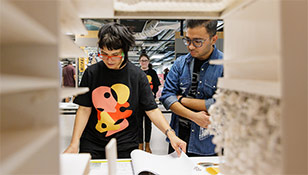Being a teenager can be a stressful, emotional experience at the best of times—and exams can take that turbulence to the next level. As a parent or guardian, it’s natural for you to want to help, but providing the right sort of support isn’t always straightforward.
But no matter what form it takes, your assistance is crucial to your teen’s success. Research consistently shows that students with engaged parents are more motivated, have greater self-belief, and enjoy improved academic, social and wellbeing outcomes.
With that in mind, here are our top tips to keep you and your teen feeling positive as you tackle exam time together.
Keep communicating
Put aside time to chat with your teen about how you can best support them when they’re feeling overwhelmed. Some will appreciate hands-on help and others quiet encouragement, while a few will just want to be left alone. By making a game plan, you can eliminate some of the panic and the potential for stress-fuelled disagreements.
When it comes to studying habits and exam results, ensure your expectations fall roughly in the same place as your teen’s. Having these conversations early can prevent your child from heaping unnecessary pressure on themselves, and reassure them that they’ll have your support, no matter what.
By keeping lines of communication open, it’s much easier to monitor your teen’s stress levels and intervene early if things seem to be spiralling out of control. That said, some amount of exam stress is perfectly normal. After all, even experienced musicians and actors get nervous before a major performance.
Investigate stress management strategies
If your teen is prone to exam anxiety, you might want to recommend some simple, stress-relieving strategies they can use when times get tough. Many mindfulness techniques, such as breathing exercises, are ideal, because they can be performed anywhere at any time.
Mindful breathing might sound fancy, but all it requires is focusing your attention on your inhalations and exhalations. This provides an anchor that draws the mind away from tension and anxiety, allowing you to stay present in the moment, rather than distracted by worries. While it can be difficult to perform under pressure, the more your teen practises, the more effective it can be. You might even consider taking a few minutes a day to work on it as a family.
For more ideas on how to help reduce and manage stress, the Queensland Department of Education has created a booklet of wellbeing activities for students. It includes a range of mindfulness techniques, as well as information on fostering gratitude, calming physical exercises, self-care for young people and even a weekly wellbeing routine.
Encourage healthy habits
Just because your teen is busy with schoolwork, it doesn’t mean it’s a good idea for them to start skipping meals or sleep to squeeze in more study. In fact, doing so may end up having a negative rather than positive effect. Encourage your teen to eat regular, balanced meals to keep their energy up, get plenty of rest and take occasional breaks for relaxation and physical exercise.
Cramming—while relatively common—should also be discouraged, particularly on the day of the exam. Such high-intensity study only increases tension and anxiety, which can reduce your teen’s ability to recall information. Instead, encourage them to do something that helps them relax, whether that’s exercise, colouring and doodling, listening to music or meditation.
Support their study
There are lots of little things you can do to make study smoother and less stressful. These include everything from setting up a productive, distraction-free work area and keeping younger siblings from interrupting. You could also ease up on household chores while your teen is hitting the books. It’s also important to know when all your teen’s exams are, so you can ensure they’re at school with plenty of time to spare, and with all the equipment they need.
Other impactful ways you can support your teen while they study include collaborating on a timetable, so you’re both aware of important deadlines, and talking to them about how they can make the most of their study. If you’re not sure where to start, the Griffith University Library has a great range of resources on study skills and techniques, covering everything from time management and pre-exam preparation to active reading, critical thinking and effective notetaking.
You may also want to suggest that your teen takes some time to run through sample and past papers for each of their exams. These are available via the QCAA website in the Assessment tab for each subject. Practising exams is a great way to reduce stress and instil some extra confidence in your teen. If they’re open to it, chat through how they approach questions, what to do if they’re not sure of an answer, and practise completing the exams in the amount of time they’ll have on the day.
Check in afterwards
For many teens, final exams will be one of the most stressful events in their lives thus far—the culmination of over a decade of schooling—so it’s likely they’ll still be feeling anxious, even after they’re over. That’s why it’s important to continue to offer support, even after they’ve answered their last question.
If your teen is struggling with the wait for their results, it might be helpful to start planning for the future, plotting out best and worst-case scenarios to provide reassurance. You may also want to encourage your teen to avoid dwelling on their performance—after all, in a year’s time, exams will be a distant memory.
Know when to reach out
While most teens will make it through their exams without a hitch, for some, the pressure can prove too much. It’s important to recognise when your teen is becoming overly stressed and be ready to reach out to a professional for help, such as a school counsellor, psychologist or your GP.














